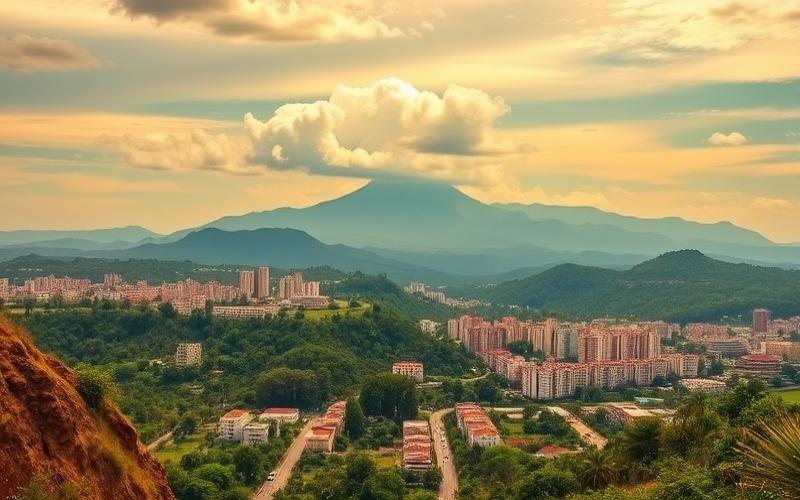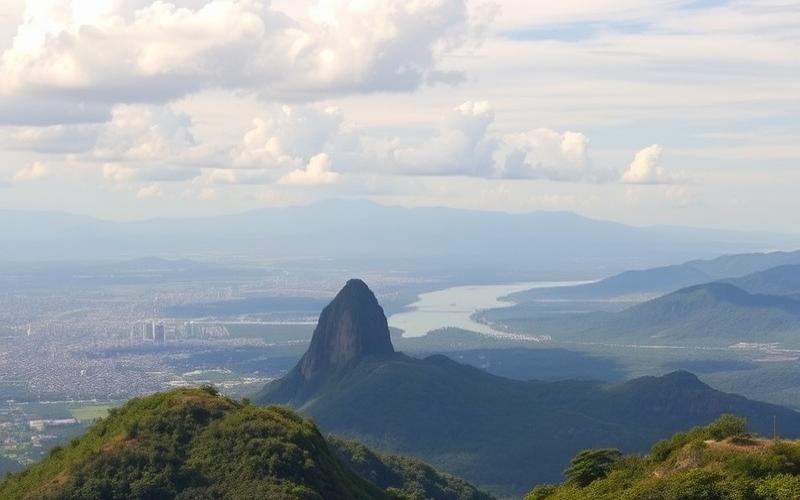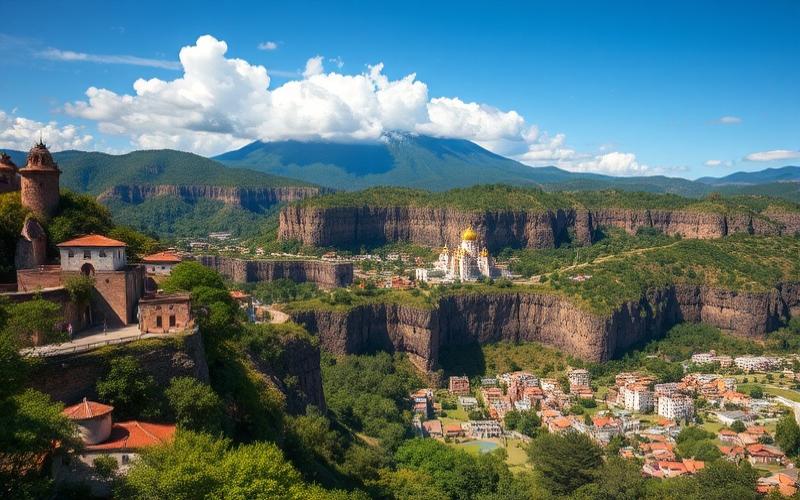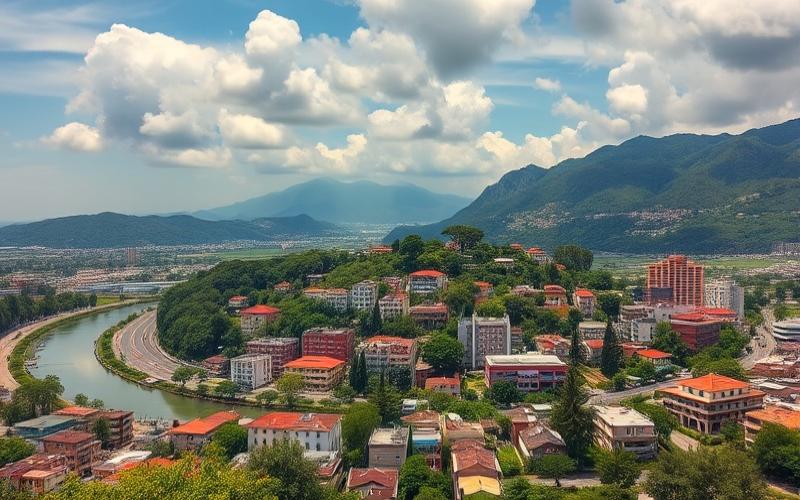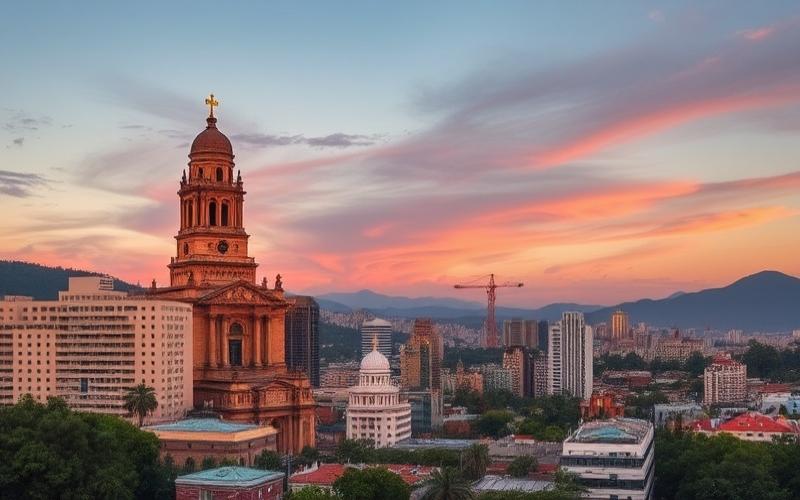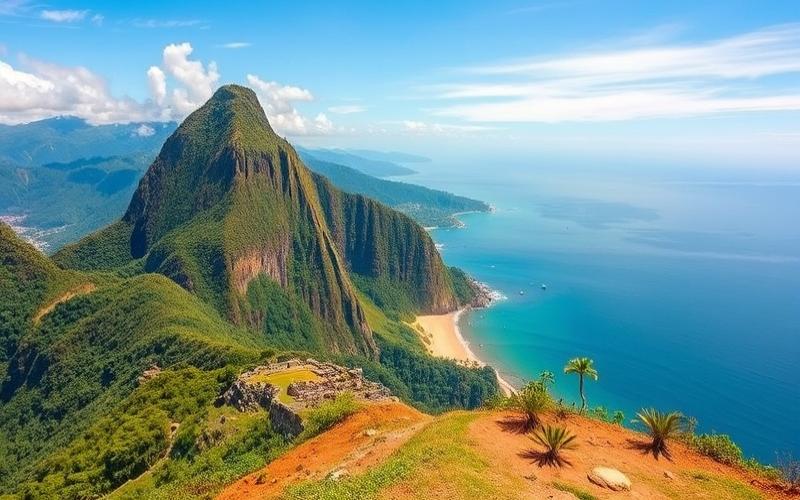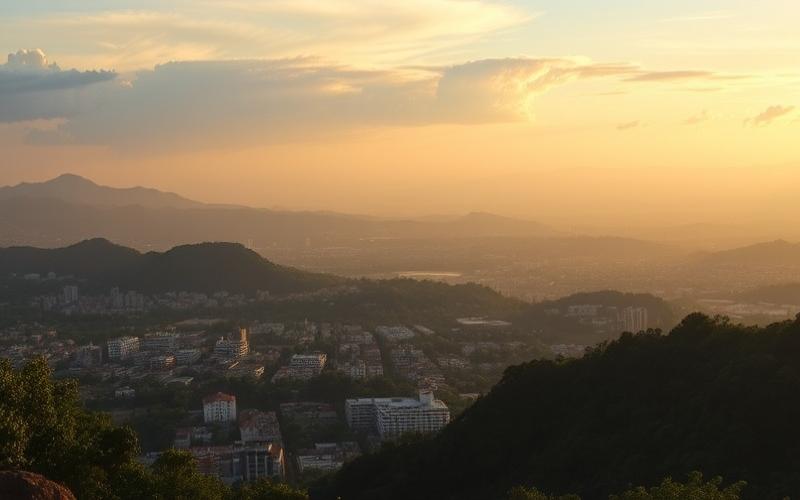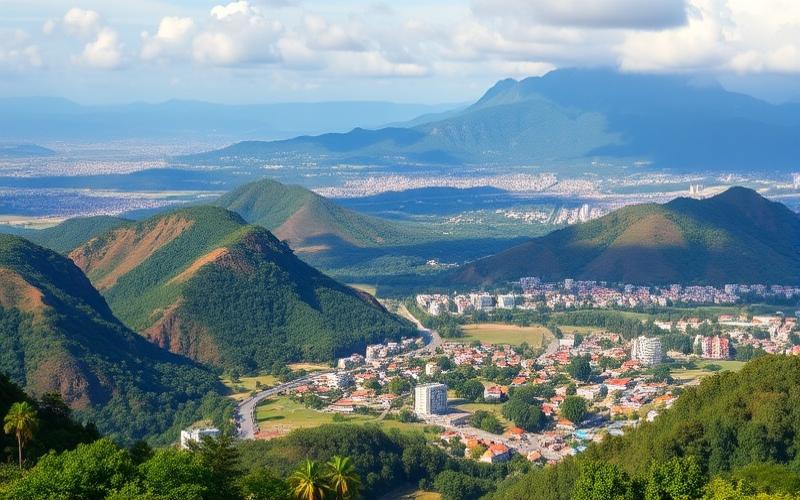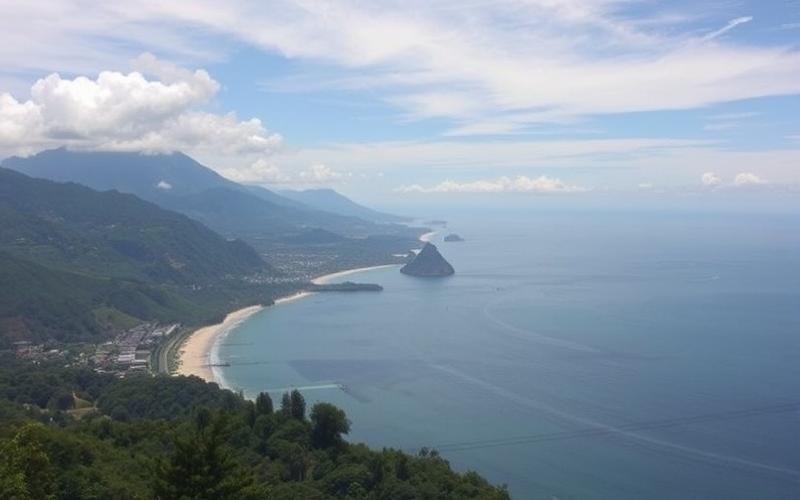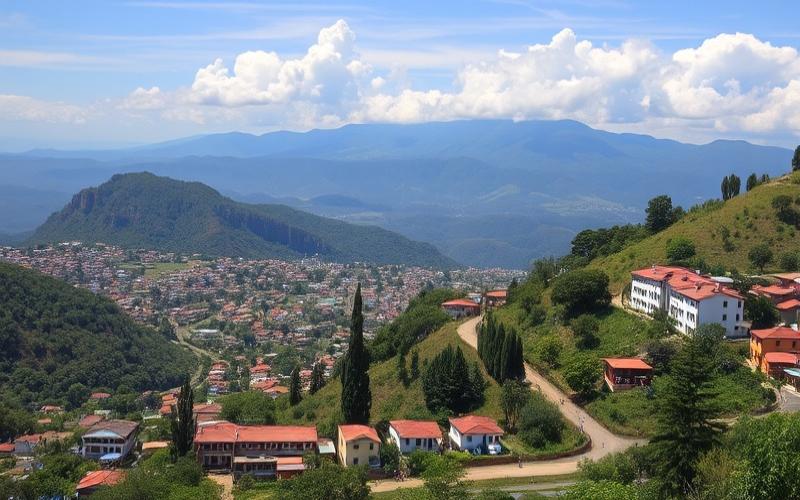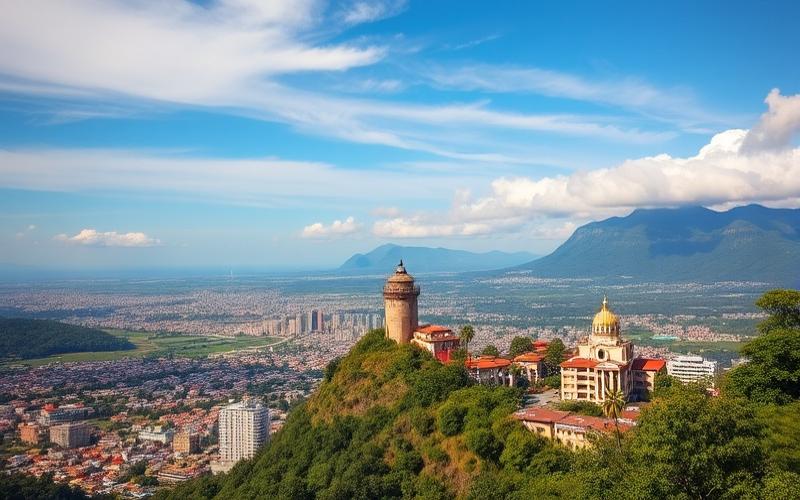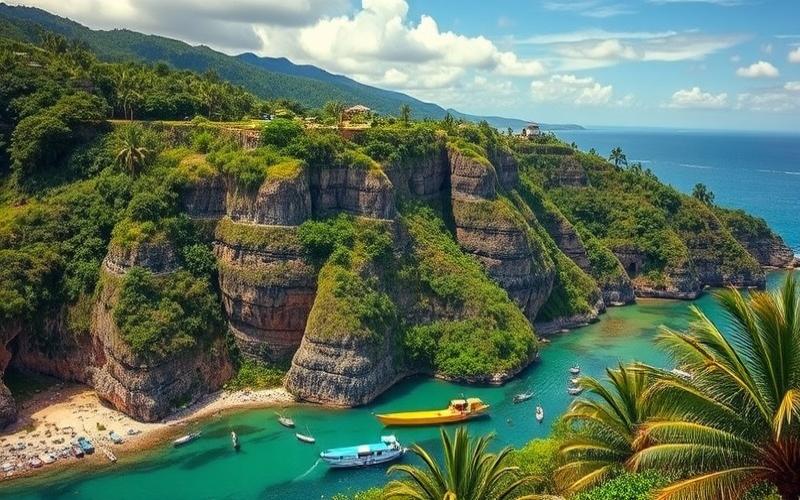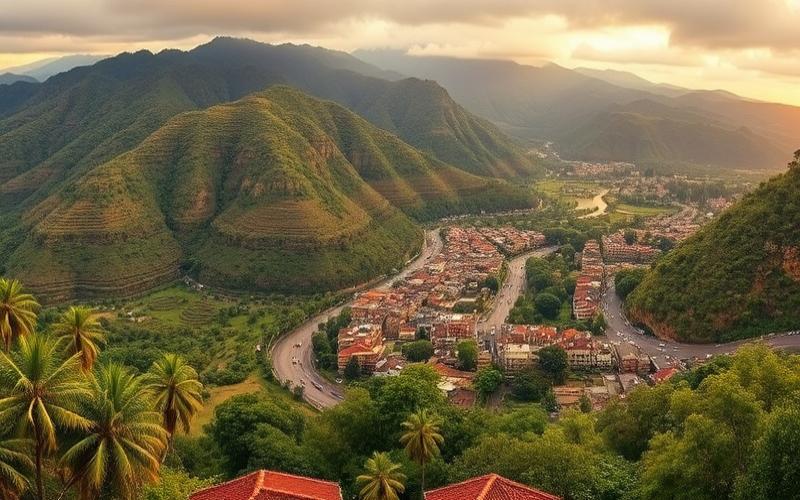
 Published on and written by Cyril Jarnias
Published on and written by Cyril Jarnias
El Salvador, often overlooked by travelers, is a vibrant country offering rich cultural heritage and stunning landscapes that attract a growing number of expatriates each year.
Located in the heart of Central America, this dynamic country appeals with both its sought-after surfing beaches and its authentic traditions.
Whether you’re drawn by the spirit of adventure, a tropical climate, or growing economic opportunities, this guide is designed to provide all the necessary information for a successful relocation.
From discovering its picturesque regions to understanding its cultural nuances, embark on a new life full of promise and personal enrichment with these valuable tips for integrating smoothly.
Preparing Before Departure: Essential Steps
Required Administrative Documents Before Departure
- Valid passport for the entire duration of stay.
- Visa or residency permit depending on duration and purpose (work, study, family reunification). Check with the Salvadoran embassy for specific requirements.
- Certified copies of important documents (birth certificates, diplomas, civil status documents).
Tips for Finding Housing from Abroad
- Use specialized expatriate websites, forums, or social media groups to identify neighborhoods and compare rents.
- Opt for temporary housing (Airbnb, hotels, serviced apartments) upon arrival to visit properties in person before signing.
- Engage a local real estate agent to assist with procedures and avoid scams.
- Check proximity to amenities (transportation, schools, shops).
Familiarizing Yourself with Local Culture and Language
- Take Spanish lessons before departure, as it’s the official language of El Salvador.
- Read cultural guides, watch Salvadoran films or series, follow local news.
- Join expatriate groups to discuss social norms, customs, and traditions.
- Learn about national holidays, cuisine, and local habits.
Importance of International Health Insurance
- The local healthcare system may have disparities in quality and cost.
- Subscribing to international health insurance (first-euro coverage or supplementary to CFE) is essential for medical expenses, hospitalizations, and repatriation, as the European Health Insurance Card is not valid.
- Compare offers to choose coverage levels suited to your needs (hospitalization, routine care, maternity, dental, vision).
- Verify that the insurance policy is recognized locally and includes 24/7 assistance.
Financial and Banking Considerations Before Departure
| Step | Practical Tips |
|---|---|
| Bank Account | Open an account in U.S. dollars (official currency in El Salvador). |
| Money Transfers | Compare bank and exchange fees for international wire transfers. |
| Payment Card | Check acceptance of foreign cards and consider getting a local card. |
| Monthly Budget | Estimate cost of living (rent, food, transportation, healthcare, education, etc.). |
| Remote Management | Enable online banking options for your current accounts. |
Information on the Local Education System (If Moving with Children)
- Research public and private schools, including international or bilingual institutions.
- Check enrollment procedures, grade levels, and curriculum offerings.
- Plan for translation and legalization of children’s school records and diplomas.
- Consult expatriate parent forums for insights on school quality.
Organizing the Move of Personal Belongings
- Create a detailed inventory of items to bring, sell, or store.
- Request multiple quotes from specialized international moving companies.
- Verify customs regulations for importing personal goods to El Salvador.
- Arrange transport insurance covering damage, loss, or theft during transit.
- Account for shipping delays and pack essentials in checked or carry-on luggage.
Note: Take time to plan each step, anticipate administrative procedures, and regularly check official websites for regulatory updates.
Good to Know:
Ensure you obtain a visa or residency permit before leaving, and consider opening a dollar account to manage finances locally. Learning about the local education system and subscribing to international health insurance are crucial for a smooth transition, as is researching housing from abroad and understanding local culture and language.
Essential Steps Upon Arrival
Administrative Documents to Prepare and Present Upon Arrival
- Passport: Valid passport, with at least 6 months validity after entry date. It must be in good condition and have at least one blank page. Minors must also have their own individual passport.
- Visa: Nationals of certain countries, including France, are exempt from visas for tourist stays (up to 2 months, at the discretion of immigration officers). This visa does not permit work. For extended stays or relocation, apply for a residency permit with the Directorate of Immigration (Dirección de Migración y Extranjería).
- Digital Arrival Card (SVDAC): Starting May 1, 2025, all travelers must complete the SVDAC digital arrival card before departure, to be presented with the passport upon arrival.
- Photocopies: Prepare paper and digital (scanned) copies of all important documents (passport, residency permit, etc.) in case of loss or inspection.
First Steps to Take After Arrival
- Register with Local Authorities: If your stay exceeds the tourist visa duration, mandatory registration with the Directorate of Immigration is required to obtain a residency permit. Prepare the following documents: passport, registration form, proof of address, and sometimes an apostilled criminal record extract.
- Obtaining a Tax Identification Number (NIT): This tax number (Número de Identificación Tributaria) is necessary for many administrative procedures (employment, banking, contracts). Obtain it from the Ministry of Finance by presenting your passport, proof of address, and the dedicated form.
Opening a Local Bank Account
Visit a bank branch with the following documents:
- Valid passport and residency permit
- NIT number
- Proof of address in El Salvador (lease agreement, utility bill)
- Sometimes a bank reference letter or employment contract
Requirements vary by bank; some accept opening with a tourist visa, others require a residency permit.
Subscribing to Health Insurance
The Salvadoran public health system is often insufficient for expatriates. It is highly recommended to subscribe to private international or local health insurance.
Compare offers to include routine care, hospitalizations, medical evacuations, and possibly repatriation coverage.
Registering for Public Services (Electricity, Internet, etc.)
To subscribe to electricity, water, or internet:
- Provide a copy of the lease agreement or property deed
- Present identification (passport and/or NIT)
- Complete a form with local providers
Some landlords manage subscriptions themselves and bill tenants; clarify this when signing the lease.
Housing Market in El Salvador
| Feature | Practical Tip |
|---|---|
| Highly variable supply | Prioritize safe neighborhoods (Santa Tecla, Escalón, Antiguo Cuscatlán in San Salvador) |
| Rare furnished rentals | Take time to visit multiple properties, negotiate price and lease duration |
| Sometimes required guarantees | Prepare a security deposit equivalent to 1-2 months’ rent |
| Contracts often in Spanish | Have the contract reviewed by a bilingual third party or lawyer if needed |
| Platforms & agencies | Use reputable real estate agencies or expatriate groups to find reliable listings |
Joining Expatriate Communities
- Join groups on social media (Facebook, WhatsApp) dedicated to expatriates in El Salvador.
- Participate in events organized by French alliances, chambers of commerce, or international associations.
- These networks facilitate integration, provide practical daily life advice, and help resolve common issues quickly.
Important
Prepare all your documents in advance and inform yourself about local specifics to avoid delays or complications when settling in El Salvador.
Support from a local community is a major asset for adapting quickly and smoothly to your new life.
Good to Know:
In El Salvador, to open a local bank account, it’s advisable to provide proof of address and have an identification card. It’s often simpler to opt for local health insurance that offers competitive rates and a good healthcare network.
Immersion and Integration into Salvadoran Community
Expatriates wishing to integrate into the Salvadoran community should pay special attention to the richness of local traditions, friendliness, and the importance of respecting customs.
Key Cultural Aspects to Know:
Festivals and Traditional Events:
- Each town celebrates its patron saint with a week of festivities: carnivals, culinary contests (like the pupusa competition), dances, rodeos, and town queen elections.
- Semana Santa (Holy Week): religious processions, colorful sawdust carpets, community celebrations.
- Fiestas Agostinas (August) and Fiesta de San Salvador: large gatherings, fireworks, music, dances.
- Las Bolas de Fuego (Fireballs) in Nejapa: participants throw flaming balls during a unique festival.
- Christmas and New Year: fireworks, shared street meals, neighbor exchanges at midnight.
- Día de la Cruz (May 3): altars decorated with fruits and flowers in front of homes to request a good harvest.
- Dia de los Difuntos (November 2): families decorate graves and honor their deceased.
Culinary Traditions:
Iconic dishes include pupusas (stuffed corn tortillas), fried yuca, tamales, plantain empanadas, elote loco (seasoned corn), chicken soup, and atol (hot corn drink).
Meals are often shared with family or neighbors, illustrating the community spirit.
Spanish Learning Opportunities and Resources for Expatriates:
- Language schools and community associations offer Spanish courses tailored to foreigners.
- Language tandems exist in major cities: informal exchanges with Salvadorans wanting to learn English or other languages.
- Local universities and some cultural centers provide workshops and resources to facilitate language integration.
Respecting Local Customs:
- Politeness and discretion are highly valued: it’s customary to greet, thank, and adopt a respectful attitude.
- Salvadorans value interpersonal relationships: handshakes or hugs among close friends are common.
- Humility and listening are respected qualities, especially in discussions about politics or religion.
Practical Tips for Involvement and Building Relationships:
- Actively participate in local festivals and community activities (volunteering, craft workshops, sports events).
- Accepting invitations to share a meal or attend a family celebration, even modest ones, is a sign of integration.
- Take time to chat with neighbors, learn names, and regularly exchange courteous words.
Examples of Successful Expatriate Experiences:
- A French expatriate shares that building lasting bonds came from participating in collective pupusa preparation during town festivals, which helped establish trust with neighbors.
- A Canadian expatriate emphasizes the importance of joining a local soccer team for quick integration, even with limited Spanish.
Common Cultural Differences and Adaptation Strategies:
| Cultural Difference | Adaptation Strategy |
|---|---|
| Time perception (punctuality) | Adopt a flexible attitude, avoid impatience with delays. |
| Indirect communication | Prioritize listening, avoid direct confrontation. |
| Role of religion | Respect Catholic faith and religious practices, even if not shared. |
| Traditional family roles | Be open and respectful of family dynamics, without judgment. |
List of Practical Tips:
- Familiarize yourself with local greeting gestures (handshake, hug, cheek kiss).
- Avoid sensitive topics in initial meetings (civil war, politics, religion).
- Sample local specialties and learn about their history.
- Join expatriate groups to benefit from their experience and network.
- Use local apps or platforms to find nearby events and activities.
Taking part in community life and demonstrating cultural openness are keys to successful immersion in El Salvador. Expatriates report that patience, curiosity, and mutual respect greatly facilitate integration and enable genuine friendships.
Good to Know:
Participating in festivals like Fiestas Agostinas and enrolling in local Spanish classes can greatly ease your integration; respecting social hierarchy and warm greetings is essential for building good relationships with Salvadorans.
Settling In Well: Housing, Visas, and Residency Permits
Available Housing Types
- Furnished apartments (1-3 bedrooms) in city centers or suburbs, often with wifi and equipped kitchens.
- Single-family homes (colonial, modern, suburban).
- Tourist residences or aparthotels, suitable for long stays.
- Villas and cabins (beaches, mountains).
- Pet-friendly rentals.
- Options for digital nomads, with dedicated workspaces.
Sample Monthly Rental Prices
| Housing Type | City Center (USD/month) | Suburbs (USD/month) |
|---|---|---|
| 1-Bedroom Apartment | 520 – 900 | 350 – 900 |
| 3-Bedroom Apartment | 500 – 1,200 | 500 – 1,000 |
| Colonial House (purchase) | 50,000 – 100,000 | – |
| Suburban House (purchase) | 70,000 – 150,000 | – |
Recommended Areas for Expatriates
San Salvador (Escalón, Santa Tecla, Las Ramblas): Safe neighborhoods, close to services, international community.
Santa Ana: More affordable prices, colonial setting, relaxed atmosphere.
La Libertad and El Tunco: Beach proximity, coastal living, surfing.
Antiguo Cuscatlán: Popular residential area, near embassies and international schools.
Tips for Finding Housing and Negotiating a Lease
- Use local platforms (Airbnb, Cozycozy) to find furnished and flexible housing.
- Plan an in-person visit before signing, verify safety and proximity to amenities.
- Always request to see the property title or official lease agreement.
- Negotiate lease duration and payment terms (some landlords accept cryptocurrency).
- Inquire about included utilities (water, electricity, internet), often not included.
- Prefer assistance from a lawyer or reputable real estate agency for procedures and document verification.
Procedures and Requirements for Visa and Residency Permit Acquisition
Tourist Visa: Issued upon arrival, valid 180 days, renewable.
Rentista Visa: For those proving at least $1,500 monthly passive income (dividends, rents, etc.). Valid one year, renewable. Allows bringing close family.
- Required documents:
- Certified and apostilled proof of income
- Application letter
- NIT card (taxpayer)
- Criminal background check (apostilled)
- Passport and photos
- Birth certificate and marriage certificate (apostilled)
- Sworn declaration of family support
Pensionado Visa: For retirees with regular pensions.
Residency through Business Creation: Invest in a local company.
Other Visas: Students, skilled workers, investors.
| Visa Type | Income Required | Duration | Renewable | Family Members Included |
|---|---|---|---|---|
| Tourist | None | 180 days | Yes | No |
| Rentista | $1,500/month | 1 year | Yes | Yes |
| Pensionado | Proof of pension | 1 year | Yes | Yes |
| Investor | Project-dependent | Variable | Yes | Yes |
Processing Times and Associated Fees
- Processing time: 2 to 4 months on average for residency visas.
- Administrative fees: Variable (approximately $300 to $800 depending on visa type).
- Apostille and document translation often required.
Assistance Services and Organizations
- Lawyers specialized in immigration and real estate law (e.g., Rodrigo, English-speaking Salvadoran attorney).
- Local real estate agencies (recommended for expatriates).
- On-site expatriate communities, forums, and Facebook groups.
- National Registry Centers (CNR) for land title verification.
- Online platforms for rental and property search (Airbnb, Cozycozy).
Practical Tips and Legal/Cultural Specifics
- Foreigners can purchase real estate with same rights as locals (except in border or coastal areas without authorization).
- Due diligence is essential: verify municipal compliance, absence of debts or disputes on the property.
- Respect local customs, community life, and traditional festivals.
- Physical presence in El Salvador is required for residency renewal (minimum 8 months per year, no absences exceeding 3 consecutive months).
- Territorial taxation means no taxes on foreign income.
- Appliances and electronics are often more expensive than in the U.S.; budget accordingly.
Key Takeaways
Consulting a local lawyer for any official procedure is highly recommended. The expatriate community and local platforms are valuable resources to facilitate your settlement.
Good to Know:
To ease your settlement in El Salvador, prioritize neighborhoods like San Benito and Santa Elena, favored by expatriates for their safety; for visas, consult Salvadoran immigration services and prepare documents such as a passport valid for at least six months. Local real estate agencies and organizations like the Franco-Salvadoran Chamber of Commerce offer valuable support for finding suitable housing and familiarizing yourself with local requirements.
Disclaimer: The information provided on this website is for informational purposes only and does not constitute financial, legal, or professional advice. We encourage you to consult qualified experts before making any investment, real estate, or expatriation decisions. Although we strive to maintain up-to-date and accurate information, we do not guarantee the completeness, accuracy, or timeliness of the proposed content. As investment and expatriation involve risks, we disclaim any liability for potential losses or damages arising from the use of this site. Your use of this site confirms your acceptance of these terms and your understanding of the associated risks.


